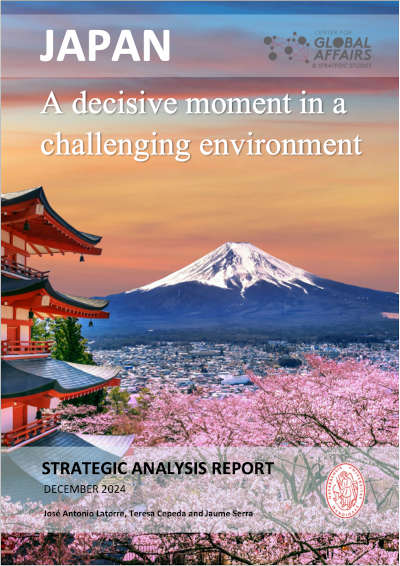In the picture
Mount Fuji and Chureito pagoda [tawatchai07].
EXECUTIVE SUMMARY
Amid rising regional tensions and shifting power dynamics, Japan's strategic path hinges on fortifying alliances and adapting its economy to counter growing security threats, particularly from China.
The Japanese country will continue to face economic stagnation but will overcome deflation by fostering corporate dynamism, social reforms, and inflation management. Public debt will continue to increase and will remain a challenge, though Japan will boost industrial output and exports will be favored through economic measures. In the microchip industry, Japan is partnering with the U.S. and Taiwanese companies to strengthen its competitive position in the midst of China's rise in the sector, which will consolidate its position through the "Chip 4 Alliance."
The demographic landscape presents significant obstacles to future economic and social stability. Japan's low fertility rate and high life expectancy are reducing its working-age population, with retirees expected to account for more than 40% of all citizens by 2070. This shift will further reduce the working-age population, which will decline from 60% today to less than 50% in 2100, placing a heavy burden on the social safety net. This will exercise increased pressure on public spending in areas such as pensions and healthcare, while Japan's restrictive immigration policies do little to offset the decline in the labor force. Without major changes in immigration and labor reform policies, Japan risks increased fiscal pressure, which will affect social services and income stability.
Japan is expanding its military capabilities in response to regional threats, particularly from China, but Article 9 of its Constitution limits the building of a conventional military force; Japan has reinterpreted the meaning to allow self-defense. Japan's security relations with the United States are marked by the reliance on its nuclear arsenal for deterrence and military support, especially given rising tensions with China, North Korea and Russia. This alliance will grow stronger, with continued U.S. military presence and deeper defense cooperation, even as Japan enhances its own military capabilities. Japan is also advancing its defense industry, and it will export arms and build a stronger industrial base, though recruitment challenges persist due to a delicate defense culture and an aging population.
China's rise is perceived as a strategic threat and Japan has consolidated alliances, particularly through its Free and Open Indo-Pacific strategy to counter Chinese influence. A cornerstone of this effort is the Quadrilateral Security Dialogue, or QUAD, with the U.S., Australia, and India, in which Japan will strengthen collaboration in defense, economy and technology. Economically, Japan is working to adapt to reduce dependency on China, strengthening ties with ASEAN countries and promoting itself as a regional leader. In the same way, it is an alternative to China's Belt and Road Initiative by funding regional projects and supporting allies through aid and loans.
Japan perceives North Korea missile tests and nuclear threats as critical security concerns, with its 2022 National Security Strategy designating Pyongyang as an imminent military threat. In response, Japan has strengthened missile defenses and engaged in closer security cooperation with the U.S. and South Korea, most notably through the Camp David Summit, which emphasized a united front against regional provocations. Should North Korea launch an attack on South Korea, Japan would likely offer defense and logistical support within its alliance framework, though its response would be limited by constitutional constraints. Despite historical grievances and territorial disputes over the Takeshima/Dokdo Islands, Japan and South Korea are moving toward a pragmatic partnership, recognizing the necessity of cooperation to counter both North Korea's aggression and China's growing influence. In the medium and long term, Japan's and South Korea's alliance is expected to deepen as both nations prioritize security and stability in the Indo-Pacific.


